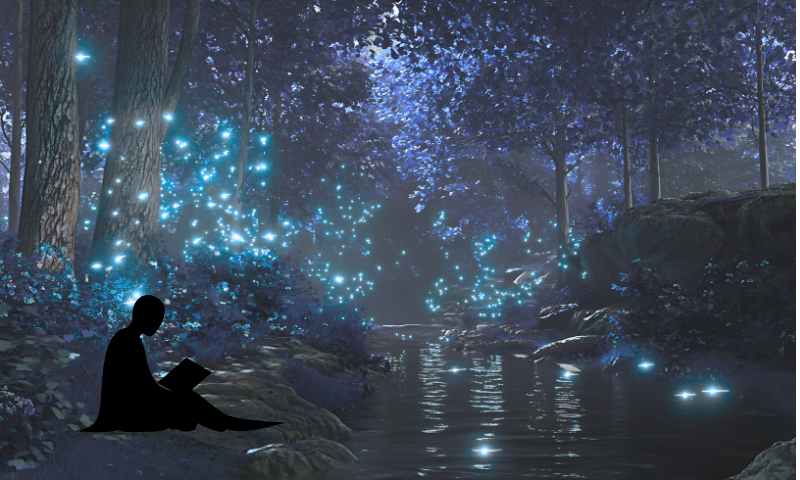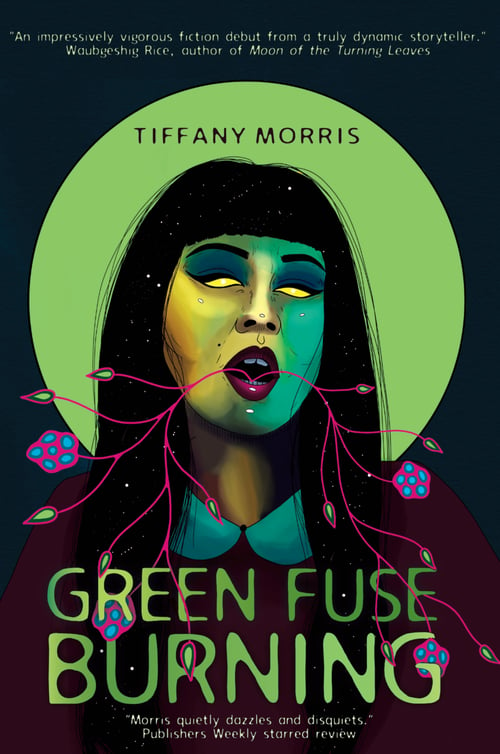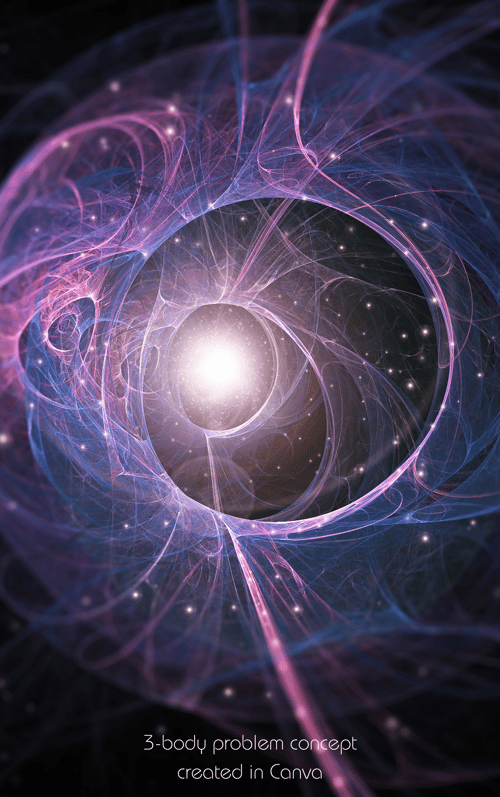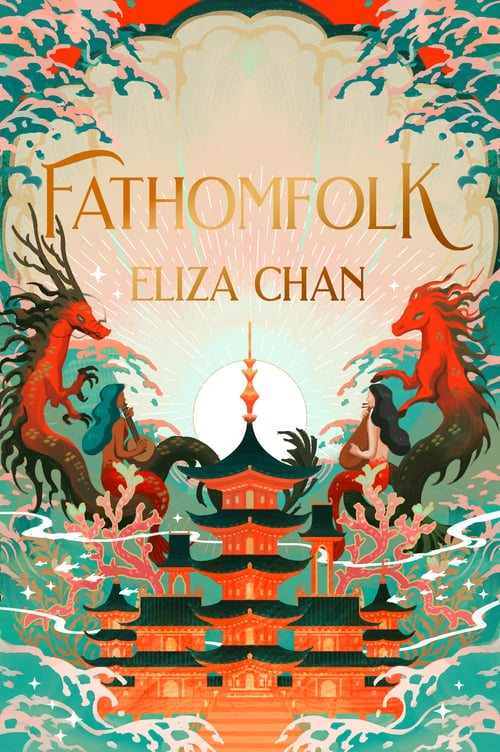
The newsletter is moving back about a week each month until the end of the year due to timing with Earth Day and family visits.
World eco-fiction spotlight
This month I talked with local author Tiffany Morris about her books, particularly her most recent novel Green Fuse Burning, “a transformative Indigenous eco-horror novella from [a] Mi’kmaw writer". I thoroughly enjoy Tiffany's poignant prose as she weaves planetary ecological horror with Mi'kmaw intergenerational grief in a story about an artist completing a residency in a cabin in a strange swamp forest.
From Tiffany:
I never really intended to write ecological horror, but I think that this moment we’re living in demanded it of me. My poetry and fiction are always a function of me working through things that are on my mind, and as the reality of climate change becomes manifest in increasingly undeniable ways, there must be an outlet and an alarm—a processing of the grief and horror that corresponds with a global sense of doomed uncertainty.

Monthly recommendation: 3 Body Problem
Speaking of doomed uncertainty, in her 1962 book Silent Spring, Rachel Carson said "In nature, nothing exists alone," meaning that survival depends on intricate interconnections provided by our ecosystems and that we cannot push nature's boundaries too far. Not in the name of progress or anything else. Chinese author Liu Cixin read Silent Spring as a boy; he had to read it in secret because the Chinese government called the book toxic propaganda. Cixin's Remembrance of Earth's Past series' book The Three-Body Problem was recently made into a Netflix series titled 3 Body Problem, and the first season is out now. The show alludes to Silent Spring (which was primarily a warning about pesticide use). One of the many dangers of using pesticides is that they obviously disrupt ecosystems and get into water, soil, and the air, so are threatening to humans, plants, and animals. They also can make insects more resistant to pesticides. While 3 Body Problem is not primarily about pesticides, it is about survival, and the ideas of bugs as pests and resistance is strong throughout.
Netflix's 3 Body Problem is produced by Game of Thrones creators David Benioff and D. B. Weiss, along with Alexander Woo, and features a soundtrack by Ramin Djawadi. I hadn't read Cixin's trilogy, but now I'm adding the first book to my reading list for May. Because...the TV series is amazing, and we devoured it within a week. The idea that "in nature, nothing exists alone" shines in the show, and Silent Spring is referenced often. I think that Cixin and other authors concerned about humanity know that planetary survival for all species is key. We do not survive alone. This is a wonderful science fiction tale; nowadays we know enough about sci-fi that it isn't always about where we're headed but where we already are and have been. Throwing in futuristic plausible technology is often fascinating but is also relatable, because the types of problems happening in 1962 are still happening more than half a century later. However, as a society we have not learned from the cautionary tales scientists have been giving us all along.

The title comes from an actual three-body physics problem with predicting the trajectories of three close gravitational, celestial bodies. Although the Netflix series takes place on Earth and showcases scientists working on related projects, there's something mysterious happening in space. The scientists' work awakens them to the realization that there is a planet out there with life forms (called San-Ti, Mandarin for three-body), but its three suns represent the three-body problem and wreak havoc on the planet. When the San-Ti's planet is within orbital distance from one of the suns, things are stable. But when it's pulled by another sun and enters the gravitational field, things become chaotic, with alternating, unpredictable ages of ice and fire. San-Ti's technology prepares some citizens to survive, but they cannot calculate the suns' chaotic trajectories, which can happen with no warning. Obviously, the San-Ti want a more habitable place to live, like Earth.
This film series appeals to me because of the typical reasons: great characters, wittiness, mystery, soundtrack, epic scope, photography and CGI, writing, and so on. But it also has a few story arcs I'm attracted to, such as the necessity of keeping our progress within bounds of nature around us, the idea of exponential technology (I caught whiffs of Daniel Quinn's Ishmael), non-linear timelines, and quantum physics, such as quantum entanglement, which has fascinated me for years. This show is incredible. Only a few series have captured my attention and imagination to the degree that I think about them a lot and can't wait for the next season. Also, the soundtrack by Djawadi is excellent but not as forefront as it was in Game of Thrones. We saw the composer and his GoT orchestras in Vancouver, and it was by far one of my favorite concerts ever. But also, in the series, is the episode intro song "Everything in its Right Place". The version played in the series is not by Radiohead but a beautiful rendition by Scala & Kolacny Brothers, a Belgian women's choir. I listened to some of their music on my run Saturday morning and my thoughts drifted to the epic: life, time-space, and science and how these things have affected my tiny life so far.
What's new at Dragonfly?
I've added some new books to Dragonfly, including Eliza Chan's FathomFolk, C Pam Zhang's Land of Milk and Honey, and Téa Obreht's The Morningside.

Rewilding Our Stories' Discord is hopping, and our book club reading extends an entire year; we're doing an environmental reading challenge with bingo card categories at Storygraph. We also discuss what we're reading on Discord. One of the moderators, Sara, even made a bingo card template for us. I'm super excited by this challenge. My books so far are:
January: Never Whistle at Night, an Indigenous anthology edited by Shane Hawk and Theodore C. Van Alst Jr. Bingo card category: Written by an Indigenous author.
February: The Botanist by WR Woodbury (uncle-in-law) and The Good-Hearted Gardeners by Suniti Namjoshi. Bingo card categories: Woodbury (written by an LGBTQIA author) and Namjoshi (author from another country).
March: Pericles, written in part by William Shakespeare and The Fifth Season by NK Jemisin. Categories: Written before the 20th century (Shakespeare) and won a literary award (Jemisin).
April: James by Percival Everett. Category: Written by a BIPOC author.
May: The Three-Body Problem by Liu Cixin, Category: Translated from another language.
More to come later!
Resources
In case you’ve missed these exciting resources at Dragonfly, which are constantly being updated, check ‘em out!
LinkTree: Find out more about me.
Rewilding Our Stories: A Discord community where you can find resources, reading, and writing fun in fiction that relates strongly to nature and environment.
Our environmental/nature song-of-the-week playlist goes back to 2015.
Book recommendations: a growing list of recs.
Eco/climate genres: They’re all over the place, and here’s an expanding compendium.
Inspiring and informative author quotes from Dragonfly’s interviews.
List of ecologically focused games.
List of eco/climate films and documentaries.
Eco-fiction links and resources.
Book database: Database of over 1,000 book posts at Dragonfly.eco.
Turning the Tide: The Youngest Generation: Fiction aimed toward children, teens, and young adults.
Indie Corner: The occasional highlight of authors who publish independently.
Artists & Climate Change. This site is no longer being updated but still has a wealth of info. I was a core writer for their team, and I’m both honored and grateful. Look for my “Wild Authors” series there.
You just read issue #40 of Dragonfly.eco News. You can also browse the full archives of this newsletter.
